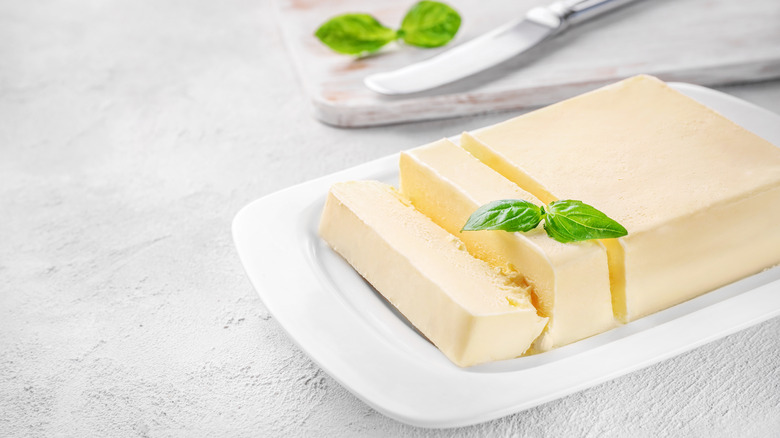How Long You Should Plan To Soften Butter Before Baking
Ever miss that part in the recipe where it says you need "softened" butter, and all you've got is a rock-hard stick straight out of the refrigerator? Mishaps like this can lead to some tough choices. Do you use it cold and hope for the best, or try zapping it in the microwave and catch it just before it melts? There's no good answer, and while there are plenty of hacks out there that can help, your baked goods will always do better with consistently softened pieces of butter.
According to The Takeout, using room temperature ingredients for your baked good will keep your batter light, and uniform. This will help when it comes time to bake, and prevent a dense cake from coming out of the oven. It's important to have softened butter ready, but just how long does your butter need to sit out to be perfectly softened?
Butter softens in about one hour at room temperature
According to The Takeout, it only takes about an hour for most butters to soften enough that they're good for baking. They note that some websites have suggested it could take up to two hours, like Sally's Baking Recipes, but said they haven't found that to be the case. If you're also preheating your oven at the same time, it could take as little as a half an hour to completely soften.
The most detail-oriented of bakers can check to see if their butter is ready by getting a reading on the internal temperature. Softened butter usually comes in at 65-75 degrees Fahrenheit. Another, easier, way to check is to simply give it a gentle touch with a finger. If the butter has some give, but doesn't completely cave in at your touch, that's usually a good sign. You don't need the butter to be melting on the counter, just soft enough that it will blend cohesively with the other elements of the recipe.
Keeping butter out on the counter regularly is another solution. Butter can stay out at room temperature for about a week without going bad thanks to its high fat content. Healthline notes that salted butters will last even longer, though unsalted is typically best for baking because of its consistency.

